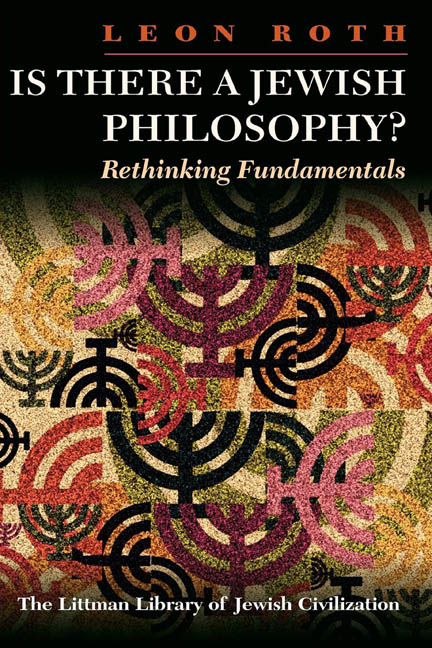Book contents
- Frontmatter
- Dedication
- Contents
- Publisher's Note
- Foreword
- Note
- Is there a Jewish Philosophy?
- Imitatio Dei and the Idea of Holiness
- Jewish Thought as a Factor in Civilization
- The Significance of Biblical Prophecy for Our Time
- Some Reflections on the Interpretation of Scripture
- Baruch Spinoza: His Religious Importance for the Jew of Today
- Judaism: The Elements
- Authority, Religion, and Law
- Moralization and Demoralization in Jewish Ethics
- Mysticism, Thick and Thin
- Back To, Forward From, Ahad Ha'am?
- Maimonides
- Bibliography of the Writings of Leon Roth
- Index
Foreword
- Frontmatter
- Dedication
- Contents
- Publisher's Note
- Foreword
- Note
- Is there a Jewish Philosophy?
- Imitatio Dei and the Idea of Holiness
- Jewish Thought as a Factor in Civilization
- The Significance of Biblical Prophecy for Our Time
- Some Reflections on the Interpretation of Scripture
- Baruch Spinoza: His Religious Importance for the Jew of Today
- Judaism: The Elements
- Authority, Religion, and Law
- Moralization and Demoralization in Jewish Ethics
- Mysticism, Thick and Thin
- Back To, Forward From, Ahad Ha'am?
- Maimonides
- Bibliography of the Writings of Leon Roth
- Index
Summary
LEON ROTH was the first Professor of Philosophy in the Hebrew University of Jerusalem. He was an ornament to that seat of learning in its early and heroic days. He served as Dean of the Faculty of Humanities and as Rector, the academic head of the university, in the crucial period of 1940 to 1943. He was for twenty-three years, virtually his entire active career, one of the three or four most influential men in the shaping of the academic structure and ethos of the university. With J. L. Magnes, the President of the university, Martin Buber, and Gershom Scholem he stood for an Arab-Jewish partnership, for forbearance, disavowal of violence, and for genuinely civilized values. He was, to the best of my knowledge, the only scholar to be elected a Fellow of the British Academy whose working life had been spent abroad. He was an inspiring teacher, a true friend, and a man of uncompromising honesty. He did not suffer fools gladly. He could be impatient with those in positions of power, but he was uniformly kind and considerate to those who sought or needed his help or advice. He possessed wisdom, wit, and charm in equal measure. He was self-effacing (anything else would have appeared vulgar to him) but was endowed with an entirely natural and unselfconscious authority of a quite unusual order. He had exceptional courage, both physical and moral: in the worst days of the Palestine troubles he would insist on seeing me home, late at night, to a remote district of Jerusalem-pretending that his constitutional took him there in any event.
Roth was born in London in 1896 to an observant Jewish family. Both his parents were descended from rabbinical families in Poland. His father, Joseph Roth, emigrated to England from Poland in 1885 and was successful in developing a glass and building materials business. Joseph engaged as a teacher for his four sons Rabbi Moshe Vilenski, who was not only a brilliant rabbinical scholar but also steeped in general philosophy. Thus, the Roth boys (the youngest of whom was Cecil, later to become a historian and Reader in Jewish Studies at Oxford University) were brought up not only as orthodox Jews but were exposed from an early age to classical European literature and values.
- Type
- Chapter
- Information
- Is There a Jewish Philosophy?Rethinking Fundamentals, pp. ix - xviiPublisher: Liverpool University PressPrint publication year: 1999

